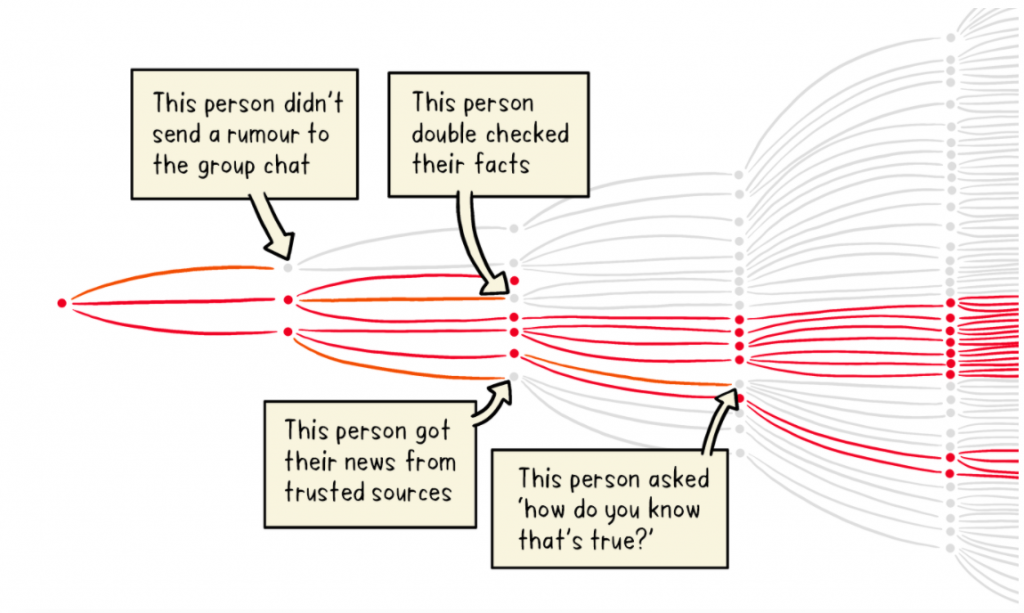Jacqueline Geekie is the Public Libraries Representative on the Information Literacy Group and is the Information Literacy and Learning Librarian for Live Life Aberdeenshire.

What do a pub landlord, a student and a librarian have in common? No, this isn’t the start of a joke, they all attended the same workshop recently with Sense about Science. A couple of months ago I was approached by Stephane Goldstein, the Advocacy and Outreach Officer for CILIP Information Literacy Group to ask if I would like to attend the workshop on Conspiracy theories and Covid-19 and as I happened to be on leave I agreed to take part and I am so glad I did. I’m not sure why I expected the workshop to be for librarians, but it was really refreshing to be in a group who have different ways of interacting with information.
First of all we discussed various conspiracy theories that we had heard. Most of us had heard the theory about the 5G masts causing Covid-19; it was a plot to undermine Trump or China had developed it as a bio-weapon. There were others that I hadn’t heard of such as it was a plot by big pharma to increase their power and profit from vaccines. Have you heard any of these or any others?
We then went on to discuss how conspiracy theories and theorists have been described. For instance, a typical conspiracy theorist has limited education and if they believe one conspiracy theory, they believe many and so forth. We also discussed how governments do sometimes lie and cover up mistakes so it can be an easy step to take to believing in a conspiracy. I tend to scroll past and not engage with any of this content on social media as I believe if I engage with it then I will find more popping up on my news feeds which I really don’t want.
Our next point of discussion was how to deal with conspiracy theorists with possible ideas being to ban them from social media or, more interestingly, from the point of view of a librarian was giving people the skills to do some research and find out who benefits from spreading these theories and how to find good sources of information.
They shared NATO’s top tips for spotting disinformation, and I think we were unanimous in not thinking of NATO as our first point of call for this type of guidance. Their top tips were to:
- Check the source
- Check the tone
- Check the story
- Check the images
- Check your biases
- Think twice before you share
Pretty good advice all in all! However, this prompted me to share the IFLA How to spot Fake news infographic which is a source I would point people towards which asks us to:
- Consider the source
- Read beyond
- Check the author
- Supporting sources?
- Check the date
- Is it a joke?
- Check your biases
- Ask the experts
All good information literacy tips but do we all follow them? Am I right not to engage on social media? I sometimes correct a story that has been fact checked as being false but only when one of my friends hasn’t beaten me to it.
On a similar vein, this week I got to attend the CILIPS Annual Conference and one of the sessions was given by Paul Gray from the Scottish Government Library, ably supported by Jenny Foreman and Morag Higginson who fielded the chat while Paul addressed us. Their session was entitled Fighting Fake news: a workshop on misinformation. They provide this training for MSPs and Civil Servants to try and stop the spread of fake news even if it is inadvertently.
Part of their training covers the use of fact checking websites and services such as Full Fact in the UK, Snopes in the USA and PolitiFact. These are all invaluable in the fight against Fake News and even more so now when the whole world is fighting against COVID-19. I use these to check the truth of some of the stories I see on social media which are dubious. They also shared this image which is from the World Health Organisation which mirrors the infographic on the spread of coronavirus. We all have a part to play in not spreading Misinformation on any topic.

Finally I can’t write about good sources of information on COVID-19 without pointing towards the list of useful resources which have been curated by the Information Literacy Group on our website. We have done the hard work for you so go check them out.



